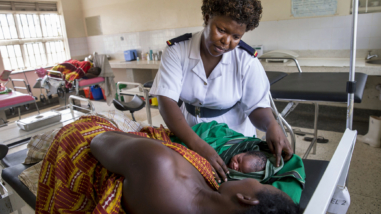Last year around this time, I used this space to offer some predictions for 2014. Every single one of them came true!
Now I’m emboldened to go beyond predictions and share my resolutions for 2015—and leave it to you to hold me to them.
I resolve to do a better job of ensuring that, even when supporting work on long-term problems, we’re attentive to near-term progress. Across each of the domains in which we work, we’re seeking large-scale social change that requires overcoming longstanding barriers, from gender-based discrimination to the over-medicalization of basic health services, and to poor (and often corrupt) public sector performance. We are patient, and don’t fool ourselves into believing that dramatic progress is likely in a few months or even a few years. The path of least resistance is always to continue the status quo—the same sensible approach, the same good partners—and to look for confirmation that incremental progress is being made. But patience and respect for past decisions have to coexist with being alert to the possibility that what we’re doing isn’t working, or isn’t working as fast as it should. That’s why I’m going to push myself this coming year to figure out the right near-term measures to help us understand (and accelerate) the progress we’re making.
I resolve to spend more time getting feedback. It goes almost without saying that people who work in foundations face a serious feedback problem. Not only are we at least one step removed from anything that could be called “on the ground,” but we also spend most of our time with organizations that receive or want funding—and they, of course, have few incentives to tell us that our thinking is simple-minded, or our proposed solutions are unlikely to work. These are problems our colleagues in the Effective Philanthropy Group here at the Foundation are tackling with other funders through the Fund for Shared Insight, and it will take these efforts and many more to find the best ways to elicit, hear, and use feedback. For my part, I need to place more priority on consultation and on setting aside time for site visits and other opportunities to observe and listen.
I resolve to be completely honest and upfront about the prospects for funding. Telling someone “no” is neither pleasant nor the route to popularity, and it’s far too easy for funders to rely on vague statements. “Not now.” “We’ll have to see.” “After our strategy refresh.” But I know from being on the grant-seeking side of the table for many years that the second-best response to a funding pitch is not “maybe”; it’s “no.” A clear “no” means those who are seeking funds can move on to look for more appropriate funders, instead of trying to figure out, often fruitlessly, how to turn a “maybe” into “yes.” In 2015 and the years after that, I’ll do my best to be clear and candid in response to requests, even at the risk of being seen as undiplomatic.
I’m hoping these resolutions are within my grasp and that I’ll be able to report back with some sense of accomplishment this time next year. In the meantime, if you have ideas for other resolutions we should be making—or for how to achieve these—do not hesitate to speak up.


